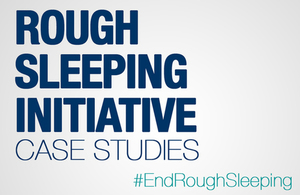Plymouth: MARS (Multi Agency Rough Sleeper) Team
Find out how funding from the rough sleeping initiative has helped develop a coordinated team of 6 to tackle rough sleeping in Plymouth.

Rough Sleeping Initiative
The local issue
A significant number of the rough sleepers in Plymouth are longer term homeless people or regular returners to the street, with most having multiple, complex needs. This means that finding an effective solution for each individual can be complicated and challenging for existing support services.
The solution
Rough sleeping initiative funding has enabled the development of a coordinated team of 6, formed in August 2018. The team is made up of staff from 4 existing provider agencies, (Shekinah Mission, Path, Bournemouth Churches Housing Association & Westward Housing) alongside Plymouth city council. They bring experience, skill and knowledge into MARS (Multi Agency Rough Sleeping Support) – the new team.
What’s different?
This team carries out assertive outreach; going onto the street, into the local day centre, into hostels, temporary accommodation, hospitals and prisons and providing floating support to help sustain tenancies once they are secured.
The team is now able to help clients in a more flexible and creative way, supporting and monitoring clients wherever they are in their journey, whether that is in a hostel, prison, hospital or tenancy.
Those using homelessness services have regular concerns around their support worker changing as they go from one service to another. With a team in place that follows the individual throughout their housing journey, the service provided is person-centred and can respond more flexibly to the individual’s specific needs.
The results
Through this service, a long-term rough sleeper despite having rejected an initial offer of social housing was eventually supported into private renting through Housing First as MARS was able to remain with him throughout his journey.
Since the formation of MARS, the team has supported more than 25 clients into accommodation.
How the government is tackling rough sleeping
The rough sleeping initiative is a cross-government plan of action to significantly reduce the number of people sleeping rough. This is backed by a targeted £75 million fund for local authorities with high levels of rough sleeping to use in 2018 to 2020.
Alongside this, the government’s rough sleeping strategy and its supporting delivery plan lay out plans both to help people who are sleeping rough now, and to put in place the structures needed to end rough sleeping for good.
On 1 October 2018 the Homeless Reduction Act 2017’s duty to refer came into force. The duty to refer means that certain named public bodies must refer users of their service who they have reason to believe are – or are at risk of soon becoming – homeless, to a local authority of the service users’ choice.